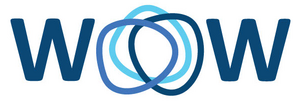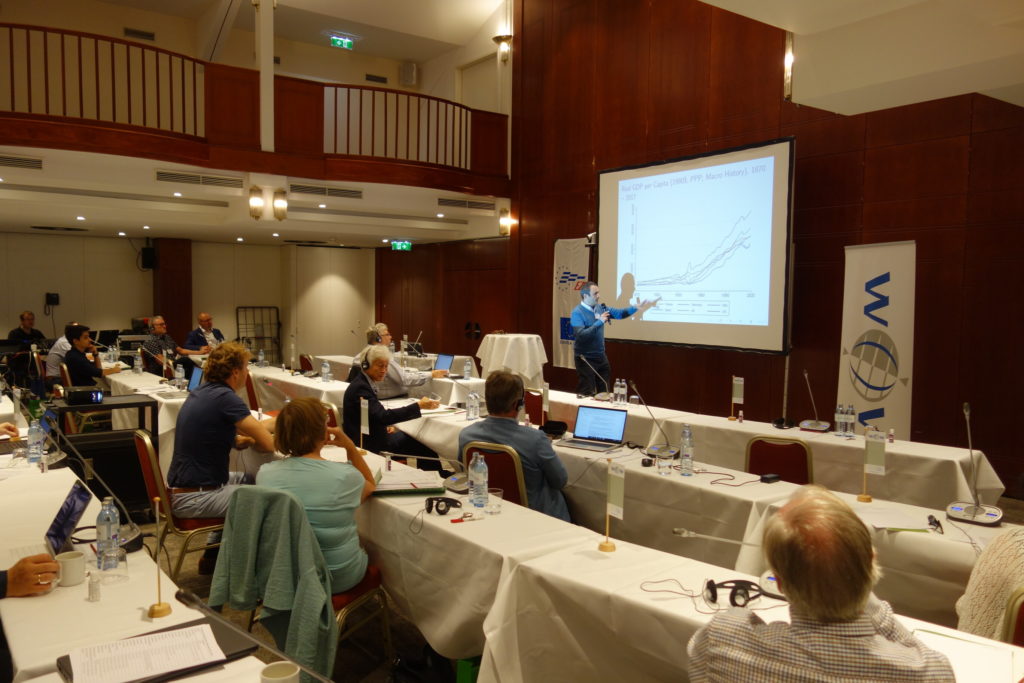Robert F. Kennedy ones said: “The gross national product does not allow for the health of our children, the quality of their education, or the joy of their play. It does not include the beauty of our poetry or the strength of our marriages; the intelligence of our public debate or the integrity of our public officials. It measures neither our wit nor our courage; neither our wisdom nor our learning; neither our compassion nor our devotion to our country; it measures everything, in short, except that which makes life worthwhile.”
Within the WOW there has been a debate of late about the need for constant growth. Questions were asked about what would happen if we would not have growth? Do we need economic growth year after year? Must companies make more profit year after year? Must companies become bigger and bigger? Is perpetual growth a good thing? In what way would the lack of economic growth affect our lives and societies?
During a two-day seminar in the city of Vienna over thirty trade union leaders discussed the importance of growth in connection with values. The experts and participants at the seminar which was organized by the World Organization of Workers (WOW) in cooperation with the European Centre for Workers’ Questions (EZA) and supported by the European Commission tried to find an answer to the question which of the two, values or growth, guides us the most.
The first speaker Mr. Vahagn Jerbashian, Ph.D., Assistant Professor of Economics at the Universitat de Barcelona (Spain) in his contribution titled ‘Technological change and economic growth: The future of work, focused on the economic mechanisms at work. In his words ‘The economy can grow because of a higher abundance of resources (e.g., accumulation of physical capital) and more efficient use of the existing resources (i.e., productivity growth).’ Growth in productivity is responsible for the largest share of growth. When looking at the importance of innovation and technological change, we see that ‘Major breakthroughs have been carried by entrepreneurs and firms with profit motives.’ This not only led to growth but also increased life expectancy and decreased infant mortality. With the speed of developments, certainly when it comes to digitalization and AI there is a fear that this will only have negative effects on society as a whole as a result of lack of employment. ‘Evidence, however, points out that technological change has created more employment than it has displaced.’
In ‘The role of digitalization for more (economic) sustainability’ Ms. Birgit Wintermann, Project Manager at the Bertelsmann Stiftung in Germany) looked at sustainability in all its forms. She stated that most people when they think of digitalization they think of more efficiency, loss of jobs, use of more raw materials, higher ecologic damage, and higher profits. This does not sound very sustainable. But digitalization is on the one hand technological advancement, but also results in new ways of working. Sustainability is not just related to the environment. It also deals with treating workers in a company in a sustainable manner. When you neglect this the costs are tremendous. People should be at the centre. This is particularly important now when so many people work remotely. What we see happening at the same time now is the transformation-cycle digitalization and the transformation-cycle sustainability.
Growth is not only economic growth. One can grow on a personal level too. This was the focus of the presentation titled ‘From shattered goals to meaning in life: life crafting in times of the COVID-19 Pandemic, by Ms. Michaéla Schippers, Professor of Behavior and Performance Management at the Erasmus University in Rotterdam, the Netherlands. In her position as Scientific director of the Erasmus Centre for Study and Career Success, she asked the question “Why are life skills not part of the curriculum?”. One is being prepared for everything but not this. Goal-setting; optimizing team and individual well-being and performance; and Life crafting are important for the performance. Both of the individual person as well as well the company, institute, organization one works for. What has become clear since the start of the pandemic is that many people experience a loss of purpose. Consequentially this could worsen the other negative effects of the crisis (financially, mentally, physically). Furthermore, it affects mostly the younger generations and future workforce. “Life crafting intervention shown to improve purpose in life, could have a significant impact on functioning, health, and wellbeing during this period.” ‘Through Goal-setting interventions we see that people regain their sense of purpose. When people set their own goals they are far more committed. The interventions have a positive psychological effect,’ Ms. Schippers stressed.
Mr. Andreas Gjecaj, Secretary General Fraktion Christlicher Gewerkschafter (Austria) in his contribution ‘The European Pillar of Social Rights from the point of view of the Christian Social Teachings’ looked at the 20 principles while incorporating the Christian Social Teachings. These teachings are the backbone of the FCG as of the WOW. These 20 principles are to guide us towards a strong social Europe that is fair, inclusive and full of opportunity.
Economy is more! Growth, but which one? This was the title of the presentation by Mr. Univ. Prof. Dr. Leopold Neuhold, Director of the Institute for Ethics and Sociology at the University of Graz (Austria). Oscar Wilde once wrote ‘Nowadays people know the price of everything and the value of nothing.’ When we look at growth we should consider three things:
- Not all growth is the same
- Growth is not a value in itself, it is an empty value
- What goals should growth serve?
Work and growth is not everything. There is far more too it. One should consider what and how things are produced; for whom; what the purpose is of work. One should look at sustainability and care for future generations. One should look at what is really important. Taking care of the other for example. At some point enough is enough. Epikur von Samos stated: If enough is too little, nothing is enough’.The problem, however, is that the business of business is business. So there are contradicting perspectives at work.
A very different perspective was presented by Ms. Dr Doris Schneeberger, Institute for Change Management and Management Development (Austria). In ‘Expanding the Moral Circle: Longtermism and Antispeciesism’ she treated the topic from a moral and ethical perspective. She explained the moral cycle as follows: “A moral circle is the boundary a being draws around those entities in the world which this being deems worthy of moral consideration.” What can be seen today is that “Egoism, apathy, and violence are the norm.” The specie humans have achieved rights for themselves, but not for the others. They are still violently speciesist, meaning that humans are “discriminating beings due to their species membership.” “Humans need to stop
exploiting nonhuman animals. Humans face possible extinction due to consequences of
their maltreatment of other animals.” The current pandemic serves as a good example for this. The antibiotics resistance is growing. Humans should really accelerate the expansion of the moral cycle in order not to worsen things further. It shows that growth should be considered differently.
Mr. Mag. (FH) Josef Baumüller, Research Associate prae doc, Vienna University of Economics and Business (Austria) spoke of “Accounting for a Sustainable European Economy? – European sustainability reporting and new ways of holding European companies accountable”. At the Treaty of Amsterdam in 1997 there was a rise in non-financial reporting within the EU. There was a demand to “disclose information to the extent necessary for an understanding of the undertaking’s development, performance, position and impact of its activity.” Then after there was a fall in non-financial reporting. Instead a new system for transparency on sustainability within the EU was introduced. Here the value-to-society was looked into. And what can be seen is that “The results show that the positive effects clearly exceed the negative effects of our economic activity at every stage of the value chain under consideration”. So it pays off to put effort in this type of accounting.
The final presentation was on “Meaningful Work”. Ms. Ike Wiersinga, Member Board WOW-Europe and Negotiator CNV Vakmensen (Netherlands) started off with asking the question what is meaningful work for you. Meaningful work, work having meaning is often considered a vague term. Ms. Wiersinga, as negotiator, was asked to make it more practical and she did so by dividing it in twelve subthemes. To mention a few of these subthemes: Security, Satisfaction, Values, Ethics, Autonomy, Significance. Thereafter she connected these twelve subthemes to issues of importance in the Collective Labour Agreement. Through this approach the employees really feel that it is their CLA. That they really own their CLA. This has a connection with co-determination. There is clearly a development towards, and thus growth of, ownership.
So is economic growth only having negative effects on values? Certainly not. Economic growth has also resulted in changes of perspectives and thus values. And rising living standards make our societies more open, tolerant, and democratic. Which as consequence gives room for values to be put into practice and for people to strive for things that matter to them and society as a whole. What guides us in WOW are our values. We believe that values should essentially always come before economic growth. Economic growth should never be at the expense of other people.





